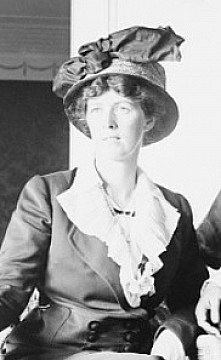Sybil (Grey) Middleton (1882-1966)
Lady Sybil Middleton, O.B.E., Commandant of the Women's Legion etc.
She was born at Howick Hall in Northumberland. On the outbreak of World War I, she trained as a nurse and after setting up a hospital in Howick Hall she was selected in October, 1915, to set up the 200-bed Anglo-Russian Hospital in Petrograd (St. Petersburg), Russia. Using her considerable influence, she succeeded in transforming a former palace into the hospital that treated only ordinary Russian soldiers. It was officially opened by the Tsarina in 1916 and Sybil's biographer and grandson, Simon Boyd, added that Sybil, "also proved inspirational when it came to defending her hospital during the Russian Revolution". She went on to establish the first of several field hospitals at the Front when she was accidentally wounded in the face by a Russian hand grenade. After recovering in England, she returned to Russia where she, "became embroiled in the murder of Rasputin". She was a first-hand witness to the horrors of the Russian Revolution and kept, "a vivid day-by-day diary in a battered notebook".
She returned to England to look after her father who died in August, 1917. Her next role was as the Commandant of another hospital in London that had been set up in Dorchester House - her uncle’s mansion on Park Lane. Her last wartime role saw her posted to France as Commandant of the Women’s Legion, "the first all women-uniformed detachment of the British Army which provided ambulance and staff car drivers".
She was eventually married at the age 40 to Lambert William Middleton, and they had two children. She and her husband travelled to South America soon after they were married and travelled frequently to South Africa and Canada (where her father had been Governor-General and his mother had been brought up). Sybil was a pioneer of photography and on the outbreak of World War II was involved with the Red Cross, the local Air Raid Prevention wardens as well as other voluntary activities. After her death, one of the 100 plus people who wrote to express their condolences remembered, “… her joy in all loveliness and her ready sympathy, her laughter and the splendid clarity of vision and the wholesome astringency she put into her advice that was so good for one. She has bound her friends in a sort of goodly fellowship." In 2017, from her letters and diaries her grandson, Simon Boyd, wrote Lady Sybil: Empire, War and Revolution.
She returned to England to look after her father who died in August, 1917. Her next role was as the Commandant of another hospital in London that had been set up in Dorchester House - her uncle’s mansion on Park Lane. Her last wartime role saw her posted to France as Commandant of the Women’s Legion, "the first all women-uniformed detachment of the British Army which provided ambulance and staff car drivers".
She was eventually married at the age 40 to Lambert William Middleton, and they had two children. She and her husband travelled to South America soon after they were married and travelled frequently to South Africa and Canada (where her father had been Governor-General and his mother had been brought up). Sybil was a pioneer of photography and on the outbreak of World War II was involved with the Red Cross, the local Air Raid Prevention wardens as well as other voluntary activities. After her death, one of the 100 plus people who wrote to express their condolences remembered, “… her joy in all loveliness and her ready sympathy, her laughter and the splendid clarity of vision and the wholesome astringency she put into her advice that was so good for one. She has bound her friends in a sort of goodly fellowship." In 2017, from her letters and diaries her grandson, Simon Boyd, wrote Lady Sybil: Empire, War and Revolution.






